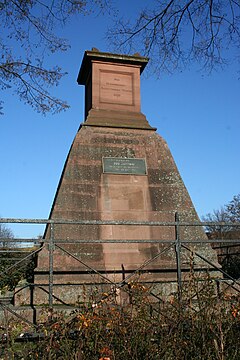Battle of Seckenheim
| Battle of Seckenheim | |||||||
|---|---|---|---|---|---|---|---|
| Part of Bavarian War (1459–63) | |||||||
 Memorial to Battle of Seckenheim, 30 June 1462 |
|||||||
|
|||||||
| Belligerents | |||||||
|
|
|
||||||
| Commanders and leaders | |||||||
|
|
|
||||||
| Strength | |||||||
| 3,100+ | 6,000-8,000 | ||||||
| Casualties and losses | |||||||
| 12 knights killed many grooms killed |
40+ knights killed 327 captured |
||||||
The Battle of Seckenheim (June 1462) saw the army of the Electoral Palatinate led by Frederick I, Elector Palatine and his ally Dieter von Isenburg face an invading army led by Charles I, Margrave of Baden-Baden, Ulrich V, Count of Württemberg, Louis I, Count Palatine of Zweibrücken and George of Baden, the Bishop of Metz. Without warning, Frederick suddenly struck at the invaders, trapping them in the fork of two major rivers. Though about 300 knights cut their way out, causing many non-combatant casualties, the Palatine forces were victorious. Frederick captured three of the enemy leaders and wrung ransoms and territorial concessions from them. Seckenheim is now part of the city of Mannheim in the state of Baden-Württemberg, Germany. The combat occurred during the Mainz Feud (Mainzer Stiftsfehde), part of the larger Bavarian War (1459–63).
On 4 July 1460, Frederick I, Elector Palatine defeated Dieter von Isenburg in the Battle of Pfeddersheim. But in the fall of 1461, Pope Pius II replaced Dieter as archbishop of Mainz with Adolph II of Nassau. In his desire to reclaim his former position, Dieter sought Frederick's assistance and handed over substantial territories to the Palatinate as payment. Irritated by this defiance, the pope excommunicated both Dieter and Frederick in early 1462. At the same time, the pope's ally Frederick III, Holy Roman Emperor declared war on the two. Ulrich V, Count of Württemberg, Louis I, Count Palatine of Zweibrücken, Charles I, Margrave of Baden-Baden and his brother George of Baden, Bishop of Metz formed a coalition against Frederick and in favor of Adolph II.
...
Wikipedia
